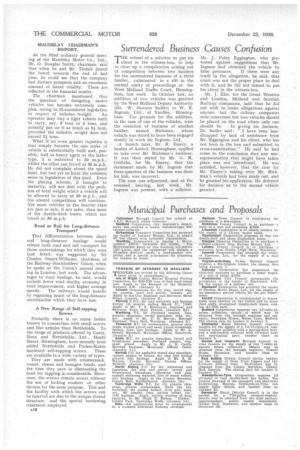MAUDSLAY CHAIRMAN'S REPORT.
Page 20

If you've noticed an error in this article please click here to report it so we can fix it.
At the 32nd ordinary general meeting of the Maudslay Motor Co., Ltd., Mr. 0. Douglas Smith, chairman, said that when he and Mr. Tisdale joined the board towards the end of last year, he could see that the company had distinct prospects and an enormous amount of latent vitality. These are reflected in the financial results.
The chairman mentioned that the question of designing motor vehicles has become extremely com.plex, owing to ill-considered legislation in respect of unladen 'weight. An operator may buy a light vehicle built to carry, say, 3 tons to 4 tons, and actually put on it as rnticli•as 91 tons, provided the unladen weight does not exceed 21 tons.
What is an even greater injustice is that. simply because the one make of vehicle is substantially built and; possibly, half as heavy again as the latter type, it is restricted to 20 m.p.h., Whilst the other can travel at 30 m.p.h. -He did not complain about. the speed limit, but had yet to learn the common sense in legislation of this kind. • Even the plating scheme; if brought to maturity, will not deal with the problem of total weight which a vehiele will be allowed to carry at 30 m.p.h., and the absurd competition will continue. Yet most vehicles in the heavier class are just as safe, if not safer, than most of the double-deck buses, which can travel at 30 m.p.h.
Road or Rail for Long-distance Transport?
That differentiation between short and long-distance haulage would release both road and rail transport for those undertakings for which they were best fitted, was suggested by Sir Charles Stuart-Williams, chairman of the Railway Stockholders' Union, when he spoke at the Union's annual meeting in London, last week. The advantages to road haulage, he said, would include fewer road deaths, economy in road improvement, and higher average speeds. The railways would benefit by regaining much of the long-distance merchandise which they have lost.




































































